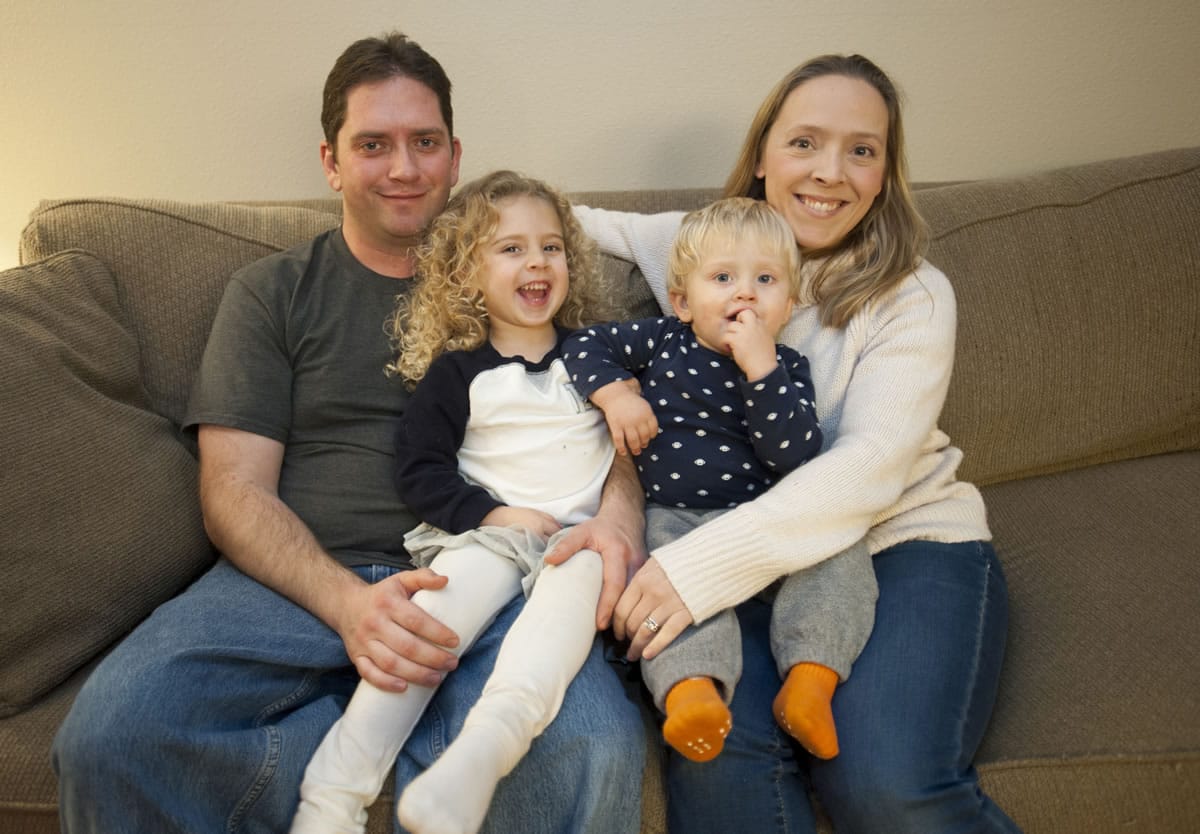Korey Cochran spent his 37th birthday in a hospital bed at Kaiser Sunnyside Medical Center in Clackamas, Ore.
Three days later, the husband and father of two young children learned he has a rare and aggressive form of brain cancer that will likely claim his life before he turns 39.
“Total shock,” Cochran said of the diagnosis. “All I could think about was, ‘What’s going to happen to my kids?’ ”
About a week earlier, Cochran had noticed that his speech seemed a little slurred. Cochran chalked it up to his lifelong habit of mumbling. But in the early morning hours of Nov. 13, the Vancouver man awoke to a seizure.
“I knew what was happening, but I had no physical control,” he said.
Cochran’s wife of 12 years, Kerry, called an ambulance and Cochran was rushed to Legacy Salmon Creek Medical Center in Vancouver. There, a CT scan showed two masses in his brain.
Cochran was sent to Kaiser Sunnyside for an MRI and more advanced testing. Before the MRI, Cochran experienced another seizure.
“At that time, the best-case scenario was a stroke,” Cochran said, “so that’s what we were hoping for.”
The neurologists explored every possible option they could come up with — a stroke, an infection of some sort — because Cochran, they believed, was too young and healthy to have cancer. But after ruling those possibilities out, they performed a biopsy on the masses growing in Cochran’s head.
“I remember when I was in the recovery room, I was coming to, and the surgeon saying it was bad, and my wife was really upset,” Cochran said.
The initial findings weren’t good, but the neurology experts had to wait for the pathology reports to know for sure. Two days later, on Nov. 17, Cochran learned he had glioblastoma multiforme. Cochran’s doctors told him he had nine to 18 months to live.
The diagnosis devastated Cochran and his family.
“You just kept waiting for someone to say it was something else, to lead you down a different path, and it just never happened,” said Kris Cochran, Korey’s brother. “It’s just unreal. Just like everybody says, you never expect it to happen to you or your family.”
Glioblastomas are aggressive tumors that arise from the star-shaped cells that make up the supportive tissue of the brain. The tumors are usually highly cancerous because the cells reproduce quickly. They also have fingerlike tentacles, making it difficult to completely remove the masses, according to the American Brain Tumor Association.
During a phone call, Cochran’s doctor briefly described the diagnosis and standard course of treatment. If Cochran had two tumors, he explained, it was safe to assume the cancer was everywhere in the space between the masses.
“They know it’s impossible to get rid of all of it,” Cochran said.
In the three weeks since the diagnosis, Cochran has had countless tests and consultations with medical providers. Cochran, his wife and their friends have spent hours researching experts, clinical trials and lifestyle changes.
Last week, Cochran had the staples removed from his head. At this point, it doesn’t look like he will undergo another surgery, but he’s waiting for one more consultation with another neurosurgeon this week.
Instead, Cochran will likely begin a six-week treatment course of radiation on Dec. 14. After the daily radiation, he will begin chemotherapy.
In the meantime, Cochran has altered his diet — eating more vegetables and higher-fat oils and less protein — began drinking green tea and is using essential oils.
“Anything that shows any type of result, I’m trying,” Cochran said.
Cochran also has continued to work. He’s a computer support specialist in the city of Vancouver’s information technology department; his supervisors have allowed him to work from home most days and adjust his schedule to accommodate doctors’ appointments.
His co-workers organized a toy and gift drive in his honor. Korey’s Joy Drive collected gifts for Cochran’s children — Kyrsten, 4, and Kynen, 20 months — as well as other children in the community. People also donated money to help Cochran pay medical bills and other related expenses.
Kris Cochran launched a GoFundMe account — www.gofundme.com/koreycochran — to raise money for his brother, as well. If Cochran decided to enroll in clinical trials or seek out-of-state treatment, the family will likely incur additional expenses. The account has already collected about $32,000, some of which came from people Cochran, a lifelong Vancouver resident, hasn’t talked to since he was a child.
“I don’t even know what to say,” Cochran said of the support. “It’s so incredible. … There’s people I don’t even know who are donating.”
Since the diagnosis, Korey Cochran also has been spending every second he can with his children. He said he tries to live in the moment, cuddling with his kids and telling them over and over how much he loves them. He takes photos of them playing, records video of their time together.
His parents, Kris and Kris’ family have been spending more time together with Korey. They have dinner together, put up Christmas decorations or just watch the kids play. They embrace being together.
“It’s just so easy to lose perspective of what matters,” Korey Cochran said.
“I was very much a person who took things for granted,” he said, “and in a split second, everything changed.”




